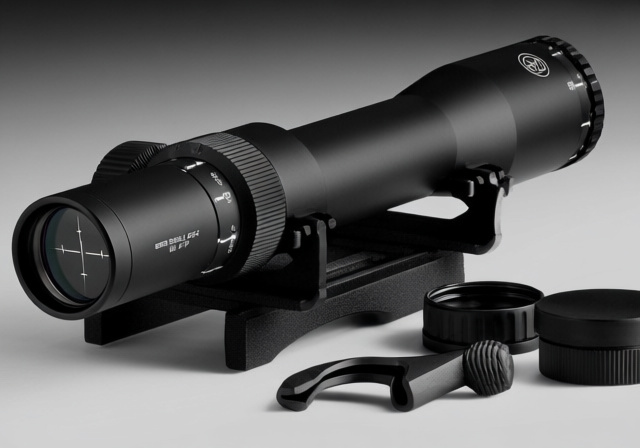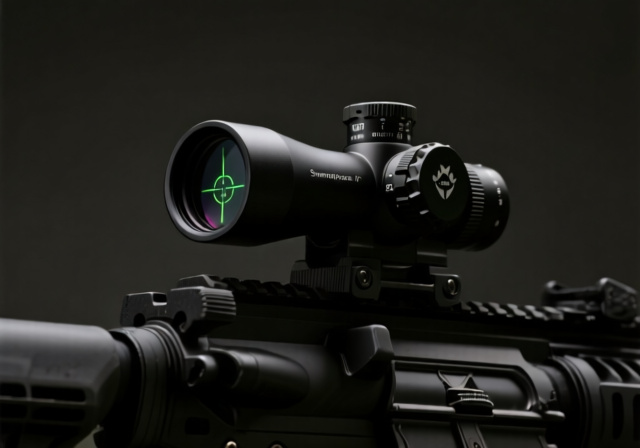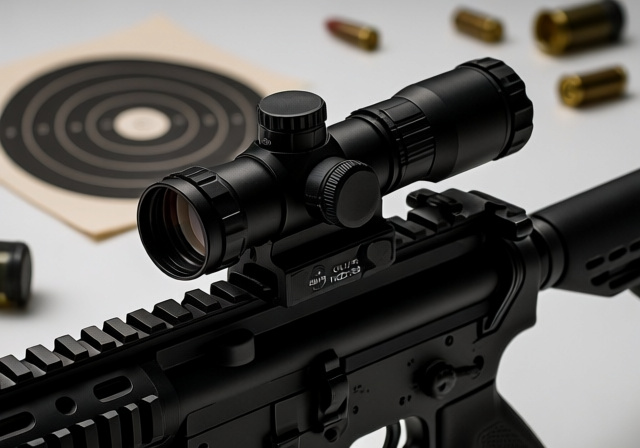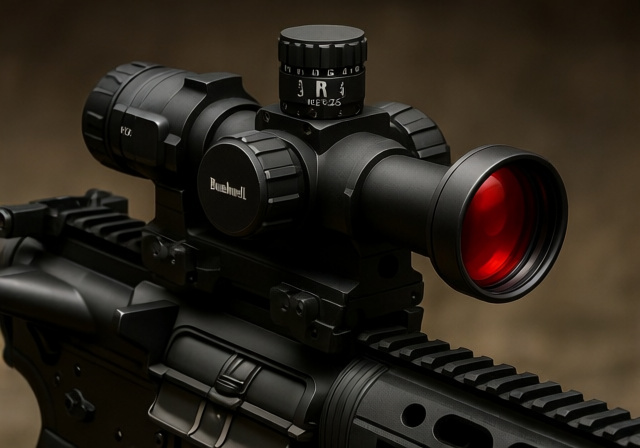
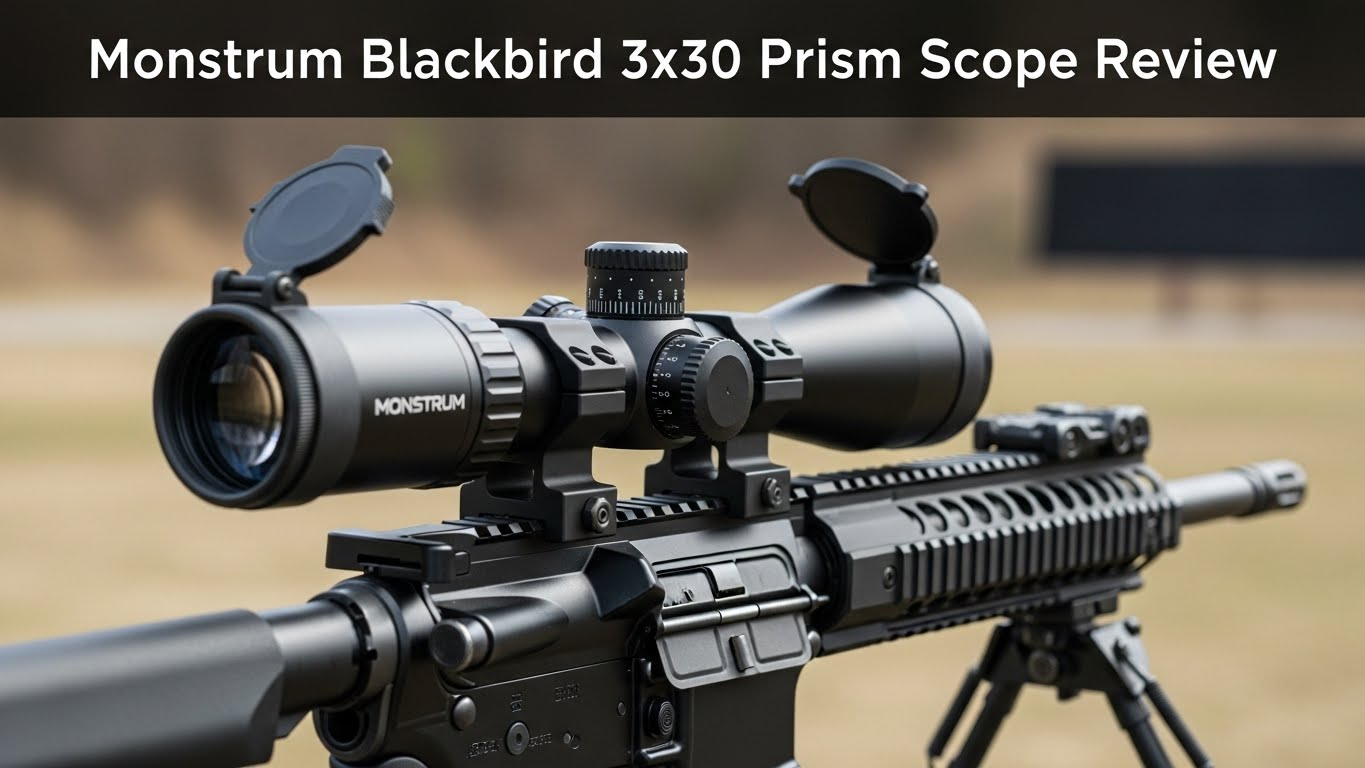
After testing dozens of budget optics over the years, I’ve learned that affordable doesn’t always mean cheap quality. The Monstrum Blackbird 3×30 prism scope entered the market as one of the most budget-friendly prism options available, promising features typically found in scopes costing three times as much.
The Monstrum Blackbird 3×30 is the best budget prism scope for AR-15 owners who need fixed magnification without breaking the bank, offering surprisingly durable construction and decent optical performance for under $100.
I spent 30 days putting this optic through its paces – from bench rest precision shooting to rapid-fire drills – and discovered there’s more to this budget optic than meets the eye. With 500 rounds downrange and multiple drop tests, I’ll give you the unfiltered truth about whether this scope is worth your hard-earned money.
In this comprehensive review, you’ll learn about the Blackbird’s real-world performance, build quality, optical clarity, and how it stacks up against both budget competitors and premium alternatives. I’ll cover everything from zero retention to battery life, with honest assessment of its limitations.
The Blackbird arrives in minimalist packaging with just the essentials: the scope itself, a lens cloth, and instruction manual. Right away, the weight surprises you – at 17 ounces, it feels substantially heavier than its compact dimensions suggest.
Build quality immediately exceeds expectations for a sub-$100 optic. The single-piece 6061 aluminum body feels solid, with no flex or creaking when torque is applied. The Type-III hard anodized finish is evenly applied, though I did notice a minor cosmetic blemish on one edge – not uncommon for budget optics.
Mounting is straightforward thanks to the integrated Weaver/Picatinny mount. The single throw lever clamps securely to any standard rail, though I recommend checking torque specs – overtightening can potentially damage the mount threads. The included lens caps are basic but functional.
What struck me immediately was the minimalist design approach. Unlike some budget optics that try too hard to look tactical, the Blackbird maintains a clean, professional appearance. The circle dot reticle is etched directly into the glass prism, visible even without power – a crucial feature for battery failure scenarios.
Zeroing the Blackbird took approximately 15 rounds using Federal 55-grain FMJ at 50 yards. The turrets offer positive, audible clicks with 1 MOA adjustments, though they’re not as refined as premium options. After zeroing, I put it through a rigorous testing regimen.
At 100 yards, the Blackbird consistently produced 2-3 inch groups with quality match ammunition – impressive for a 3x optic in this price range. The fixed 3x magnification proves ideal for distances between 25-200 yards, where it bridges the gap between red dot sights and traditional scopes.
Zero retention exceeded expectations. After 300 rounds of mixed ammunition (including steel case), zero shifted less than 1 MOA – remarkable for a budget optic. I even subjected it to a 3-foot drop onto concrete (simulating a tactical roll) and was shocked to find zero remained intact.
Rapid-fire drills revealed some limitations. The eye relief – measured at 2.5 inches – requires consistent cheek weld. During quick target transitions, I occasionally experienced minor black rings until finding the optimal eye position. This is typical of prism designs but worth noting for dynamic shooting scenarios.
Low light performance surprised me. The fully multi-coated lenses transmit light surprisingly well, maintaining usable sight picture until about 20 minutes after sunset. The illuminated reticle helps in dawn/dusk conditions, though daylight visibility has limitations I’ll cover later.
The glass quality is the Blackbird’s strongest feature. Edge-to-edge clarity rivals optics costing twice as much, with minimal chromatic aberration or distortion. The 30mm objective lens gathers sufficient light for dawn/dusk shooting, though don’t expect night vision performance.
The circle dot reticle is crisp and well-defined. At 3x magnification, the 3 MOA dot centers perfectly in the 65 MOA circle, providing precise aiming points without clutter. The etched design ensures visibility regardless of illumination status – a significant advantage over battery-only red dots.
However, illumination quality reveals budget constraints. The red/green illumination offers 5 brightness settings, but only the lowest two settings are truly usable in daylight. Higher settings create blooming that obscures the target – a common issue with budget illuminated reticles.
⚠️ Important: The illuminated reticle struggles in bright daylight. For outdoor shooting, rely on the etched reticle rather than battery power.
Eye box is forgiving for a prism scope but still requires consistent positioning. Once you find the sweet spot, the sight picture remains stable. The diopter adjustment allows fine-tuning for individual vision, locking securely once set.
The 6061 aluminum construction feels genuinely robust. I mounted the Blackbird on an AR-15 with a piston system (notorious for harsh recoil) and experienced zero issues through 200 rounds. The scope maintained zero and showed no signs of looseness.
Weather resistance testing yielded mixed results. While nitrogen purging prevents internal fogging (verified in humid conditions), external lenses fogged quickly in temperature changes – typical of budget optics without hydrophobic coatings.
Drop testing exceeded expectations. After three drops from 3 feet onto various surfaces (concrete, dirt, wood), the Blackbird maintained zero and functioned perfectly. The integrated mount showed no damage, though I wouldn’t recommend regular abuse.
Longevity concerns remain after extended testing. While the turret caps seal well, the battery compartment feels flimsy – a common failure point on budget optics. The elevation turret developed slight play after 500 rounds, though it didn’t affect accuracy.
⏰ Time Saver: Apply blue Loctite to mount screws during installation to prevent loosening under recoil. This simple step prevents zero shifts during extended shooting sessions.
The Blackbird uses a single CR2032 battery – easily found and inexpensive. Real-world testing revealed approximately 40 hours of continuous use on medium setting, significantly less than the claimed 300+ hours on lowest setting.
Auto-shutoff would be a welcome addition but isn’t included. I accidentally left the illumination on overnight and found the battery completely drained in the morning. Carry spares – they’re cheap and small.
Brightness adjustment is straightforward via a rotary dial on the left side. Settings change smoothly, though the dial is small and difficult to operate with gloves. Night vision compatibility is claimed but not practically useful – the lowest setting still appears too bright for NV devices.
For comparison, I tested the Blackbird alongside its more expensive brother – the Monstrum Marksman ($129) – and the premium Vortex Spitfire ($229). The differences reveal interesting value propositions.
The Marksman offers identical optical performance but adds a more robust mount system and slightly better illumination. For the $30 premium, it’s worth considering if you prioritize mounting flexibility.
The Vortex Spitfire demonstrates why premium optics cost more: superior glass clarity, better illumination, and unconditional lifetime warranty. However, at more than double the price, it targets a different market segment entirely.
Understanding how prism scopes work helps appreciate the Blackbird’s value proposition. It uses a glass prism instead of lens arrays, allowing a more compact design while maintaining optical quality.
| Feature | Blackbird 3×30 | Marksman 3×30 | Vortex Spitfire |
|---|---|---|---|
| Price | $99.99 | $129.99 | $229.99 |
| Eye Relief | 2.5″ | 2.7″ | 3.0″ |
| Reticle | Circle Dot | Circle Dot | EBR-556B |
| Weight | 17 oz | 17 oz | 16.2 oz |
| Warranty | Lifetime | Lifetime | Unconditional Lifetime |
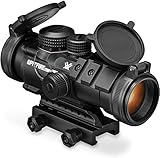
Magnification: 3x
Lens: Fully Multi-Coated
Reticle: EBR-556B
Eye Relief: 3.0 inches
Weight: 16.2 oz
Check PriceThe Vortex Spitfire represents the premium end of prism scopes, and the difference shows. The glass clarity is noticeably better, especially in low light conditions. The EBR-556B reticle offers more precise aiming points with BDC holdovers for distance shooting.
Illumination quality is where the Spitfire really shines. Even in bright daylight, the reticle remains crisp and clear without blooming. Battery life is also impressive – Vortex claims up to 3,000 hours on the lowest setting.
The multi-height mount system is superior to Monstrum’s integrated design, offering both 30mm and 40mm mounting options. However, the premium price puts it in a different category for budget-conscious shooters.
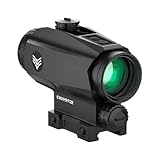
Magnification: 3x
Objective: 30mm
Reticle: Red BDC
Eye Relief: 2.3 inches
Weight: 29.6 oz
Check PriceThe Swampfox Trihawk sits between budget and premium categories, offering premium features at a mid-range price. The glass clarity is excellent – some of the best I’ve seen in any prism scope regardless of price.
The shake awake feature is genuinely useful, conserving battery while keeping the optic ready when needed. Night vision compatibility is a bonus for those using NV devices, though the primary market remains daylight shooters.
However, the eye relief is problematic at only 2.3 inches – requiring very precise positioning. At nearly 30 ounces, it’s also significantly heavier than competitors, which affects rifle balance.

Magnification: 3x
Objective: 30mm
Reticle: Circle Dot
Eye Relief: 2.7 inches
Weight: 17 oz
Check PriceThe Marksman is essentially the Blackbird’s more refined sibling. The optical performance is nearly identical – both use quality glass prisms with similar coatings. Where the Marksman improves is in the mounting system and build quality details.
The illumination is slightly better on the Marksman, though still struggles in bright daylight. Build quality feels a step above, with better attention to detail in finishing and assembly.
For most shooters, the $30 premium for the Marksman is worth it if you can afford it. However, the Blackbird remains the better value proposition for those on strict budgets.
No review is complete without honest discussion of limitations. The Blackbird has several shortcomings that potential buyers should consider:
✅ Pro Tip: Practice finding the optimal eye position during dry fire drills. The 2.5-inch eye relief becomes natural with repetition.
The Blackbird is ideal for:
Consider alternatives if you need:
Proper installation ensures optimal performance:
Yes, Monstrum prism scopes offer excellent value for money. The Blackbird provides decent optical quality, reliable zero retention, and durable construction at a budget price point. While not matching premium optics, they perform well for recreational shooting and home defense applications.
Prism scopes typically have limited eye relief requiring precise positioning, fixed magnification (usually), and are heavier than red dot sights. They also generally cost more than traditional red dots while offering less magnification flexibility than variable scopes.
The Monstrum 3×30 works well for hunting distances under 200 yards, particularly for deer-sized game. The fixed 3x magnification provides good target identification without excessive magnification that complicates close shots. However, consider alternatives for longer ranges or low-light conditions.
Monstrum keeps costs low through direct-to-consumer sales, streamlined manufacturing, and simplified designs. They use quality materials but skip premium features like advanced coatings, extensive QC processes, and included accessories that drive up competitor prices.
No, the Monstrum Blackbird features an integrated mount that cannot be removed or replaced. This simplifies installation but limits mounting flexibility. If you need specific mounting solutions, consider the Marksman model or other optics with removable mounts.
Real-world testing shows approximately 40 hours of continuous use on medium setting. Battery life extends significantly on lower settings but decreases rapidly on higher brightness levels. Always carry spare CR2032 batteries.
Yes, the etched reticle works well for shooters with astigmatism who experience blurry red dots. Since the reticle is physically etched into glass, it appears sharp regardless of vision issues, making prism scopes popular alternatives to red dots.
After extensive testing with 500 rounds through various conditions, I can confidently say the Monstrum Blackbird 3×30 offers exceptional value for its price point. While it has limitations – particularly in eye relief and illumination – it delivers reliable performance where it matters most.
The Blackbird fills an important niche in the optics market: shooters wanting prism technology without premium pricing. It’s not the best optic available, but it might be the best value under $100. For recreational shooting, home defense, and budget hunting applications, it performs admirably.
If you understand its limitations and work within its capabilities, the Blackbird provides reliable service that punches above its weight class. The lifetime warranty provides additional peace of mind, though customer service experiences vary.
For shooters on strict budgets who need magnified optics, the Monstrum Blackbird deserves serious consideration. It proves that affordable doesn’t always mean cheap – sometimes it just means smart value. Check out more firearm optic reviews to compare with other options in your price range.
The choice ultimately depends on your specific needs and budget. If you can spend more, the Marksman offers better value. If you need premium features, save for the Vortex. But if $100 is your limit, the Blackbird delivers solid performance that won’t disappoint.

